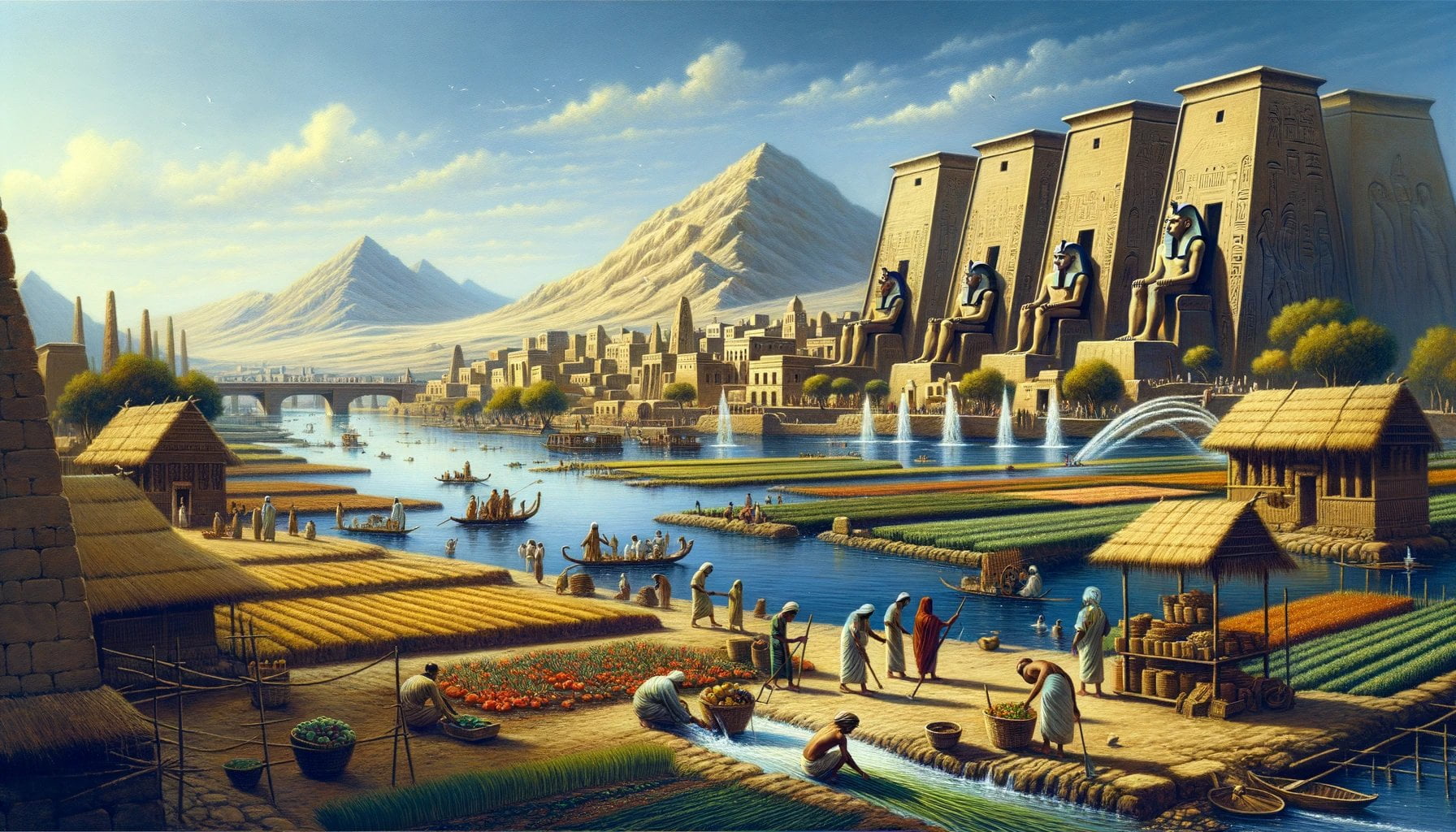The Nile’s Impact on Ancient Egypt: Unraveling its Transformative Role

Delve into the captivating story of how the mighty Nile River shaped the foundation and rise of Ancient Egypt, leaving an indelible mark on its history and culture. Explore the intricate relationship between this majestic river and the various facets of Egyptian society, uncovering the profound influence it had on agriculture, transportation, and religious beliefs. As we embark on this enchanting journey, we will unravel the transformative role played by the Nile in shaping one of the world’s greatest civilizations.
Key Takeaways:
- The Nile River played a significant role in the development of Ancient Egyptian society, history, and institutions.
- The Nile facilitated state-building and the propagation of culture by providing a means for central authority to exert influence.
- Ancient Egypt was among the earliest regions to experience urban settlements and complex societies, in part due to the Nile.
- The Nile had a central role in shaping the religious beliefs and practices of Ancient Egypt.
- The invention of papyrus in Ancient Egypt revolutionized writing and media.
- The Nile River deeply influenced the ancient Egyptian view of themselves and their world, shaping their religion and culture.
- Egyptians believed the Nile’s flooding was a result of gods’ favor and developed rituals to honor them for a fruitful season.
- Ancient Egyptian civilization was greatly influenced by the Nile’s sustainable but not perfectly reliable flooding, leading to the belief in gods and social stratification.
- The rich soil provided by the Nile enabled reliable agricultural production, ensuring a stable food supply for ancient Egyptians.
How Did the Nile Shape Ancient Egypt
The Nile River holds a paramount place in the intricate tapestry that is Ancient Egypt. Its steady flow and annual flooding undoubtedly played a transformative role in shaping this ancient civilization. Let us delve deep into the profound impact that the Nile had on various aspects of Ancient Egypt, from agriculture to religious beliefs.
The Lifeline of Agriculture
The Bounty of the Floods
The Nile’s yearly flood brought about fertile soil, replenishing the land and ensuring reliable agriculture for the ancient Egyptians. The floodwaters carried nutrient-rich silt, creating a natural irrigation system essential for bountiful crops. With the Nile’s flooding, farmers were able to cultivate and yield plentiful harvests, providing sustenance for both the population and surplus for trading with neighboring regions.
Innovations in Farming
The fertility bestowed by the Nile enabled the Egyptians to experiment with advanced agricultural techniques. They developed intricate irrigation systems and employed efficient farming methods to maximize the yield of their lands. The cultivation of crops like wheat, barley, flax, papyrus, and various fruits and vegetables became the backbone of Ancient Egypt’s economy and society.
A Balanced System
However, the Nile’s flooding was not always predictable. This unpredictability led the ancient Egyptians to develop a complex understanding of the river’s cycles and a deep reverence for its powers. They came to believe that the flooding was influenced by the gods’ favor, leading to the development of religious rituals and customs to honor and protect the Nile.
The Nile: An Ancient Superhighway
Transportation and Trade
The Nile served as a critical waterway for transportation and trade, connecting various regions of Ancient Egypt. The river provided an efficient mode of transportation for both goods and people, enabling the growth of trade networks and facilitating cultural exchanges among different cities and provinces. It acted as the lifeblood of the ancient Egyptian civilization, supporting the movement of resources, such as agricultural produce, stone for construction, and even exotic goods from distant lands.
The Invention of Papyrus
One innovation that arose from the Nile’s presence was the invention of papyrus. The ancient Egyptians crafted a writing material from the stems of the papyrus plant that thrived abundantly alongside the riverbanks. This revolutionary development replaced heavier materials like stone, potsherds, and clay, making it easier to document and transmit information. The availability of papyrus led to an unprecedented proliferation of ancient Egyptian literature, record-keeping, administrative documents, and religious texts.
The Nile’s Cultural and Religious Significance
A Divine Connection
The Nile River had a profound impact on ancient Egyptian religious beliefs and cultural practices. Egyptians believed that the river was inhabited by gods and played a vital role in their lives. The Nile was seen as a divine entity, sustaining their crops, providing them with food, and ensuring the prosperity of their civilization. The annual flooding of the Nile symbolized the gods’ favor, and rituals and ceremonies were conducted to ensure fruitful seasons and protection from catastrophic floods.
Shaping Identity and Worldview
The ancient Egyptians’ deep connection to the Nile shaped their identity and worldview. They perceived their land as a divine gift from the gods, a sacred realm that owed its existence and prosperity to the Nile. The river’s influence extended beyond agriculture and permeated every aspect of their lives, including their artistic expressions, religious beliefs, and social structure. The Nile’s presence touched the fabric of their society, connecting people across the vast and diverse landscape of Ancient Egypt.
In conclusion, the Nile River wielded immense power in shaping Ancient Egypt’s history, culture, and institutions. From providing fertile land for agriculture to facilitating transportation and trade, the Nile was the lifeblood of this advanced civilization. Its influence can be seen in the religious beliefs and cultural practices of the ancient Egyptians, as they revered and worshiped the river as a divine entity. The transformative role played by the Nile in shaping Ancient Egypt is a testament to the immense impact that geographical features can have on the development of civilizations.
In my recent trip to Egypt, I had the incredible opportunity to explore the Ancient Temples of Egypt. Trust me when I say, these temples are not to be missed! The rich history and stunning architecture will leave you in awe. Make sure to check out our guide to the temples here. You won’t regret it!
The Nile as a Source of Economic Prosperity and Wealth
The Nile River played a central role in shaping the economic prosperity and wealth of Ancient Egypt. Its annual flooding provided fertile soil for agriculture, which became the backbone of the Egyptian economy and society. Through advanced agricultural techniques and irrigation systems, the ancient Egyptians maximized crop yields and supported a more dense population.
As the lifeline of the region, the Nile’s predictable flooding and controlled irrigation produced surplus crops that contributed to social development and culture. This agricultural abundance created economic resources that attracted repeated struggles for political control of Egypt.
The Nile not only nurtured the growth of a prosperous society, but it also served as a vital transportation route. It facilitated seamless trade and cultural exchanges among different cities and provinces. The river’s importance in transportation further enhanced Egypt’s economic prosperity by allowing the movement of goods and the expansion of trade networks.
The Nile’s influence extended beyond agriculture and transportation, shaping the ancient Egyptians’ perception of their land. They revered the river as a divine entity that sustained their civilization and ensured prosperity. The cycles of flooding, abundance, and the nurturing of the soil became metaphors for their worldview and seeped into their cultural expressions, religious beliefs, and social structure.
The Nile’s impact on Egypt’s economy and society was profound, providing a source of economic prosperity and wealth. Its annual flooding created a rich agricultural landscape, sustaining a dense population and fostering social development. The river’s role as a transportation route further enhanced Egypt’s economic growth and facilitated cultural connections. The Nile’s transformative influence on Ancient Egypt cannot be understated, and its importance in shaping a prosperous civilization is evident.
Key Takeaways:
- The Nile River provided fertile soil for agriculture, supporting a dense population and social development.
- The river’s controlled irrigation and advanced agricultural techniques maximized crop yields and contributed to economic prosperity.
- The Nile served as a critical transportation route, facilitating trade and cultural exchanges.
- Ancient Egyptians revered the Nile as a divine entity that sustained their civilization and ensured prosperity. It influenced their religious beliefs, artistic expressions, and social structure.
- The Nile played a vital role in shaping Ancient Egypt’s economy, society, and cultural identity.
The Nile’s Impact on Religious Beliefs and Rituals in Ancient Egypt
Ancient Egypt’s rich and fascinating religious beliefs and rituals were deeply intertwined with the mighty Nile River that flowed through the heart of their civilization. The influence of the river on their religious practices and beliefs was profound and multifaceted. Let’s explore how the Nile shaped the religious landscape of Ancient Egypt.
1. The Nile: A Channel to the Gods
In ancient Egypt, gods played a crucial role in their society, and the Nile was often regarded as a sacred pathway connecting the divine realm with the mortal world. As the lifeblood of Egypt, the river embodied abundance and sustenance. The Nile’s impact on religious beliefs and rituals in Ancient Egypt is evident in the fact that the annual flooding of the river was perceived as a divine act, controlled by the god Hapy, who ensured the fertility of the land.
2. The Nile and the Afterlife
The Egyptians possessed a profound belief in the afterlife and the Nile World, a parallel realm of existence. They connected the Nile’s life-giving waters to the cycle of life, death, and rebirth. The river’s critical impact on ancient Egyptian religious beliefs is reflected in the construction of monumental tombs and the elaborate mummification process. The Nile’s impact on religious beliefs and rituals in Ancient Egypt is evident in how the preservation of the deceased, symbolizing eternal life, was linked to the rejuvenating powers of the river.
3. Temples: Gateways to the Divine
Egyptian temples held a central place in religious life and provided a physical space for worshippers to honor and communicate with their gods. These awe-inspiring structures showcased the Egyptians’ engineering prowess and artistic sophistication. The hieroglyphics decorating temple walls served as records of religious beliefs, depicting tales of divinity, mythology, and pharaohs’ devotion. The Nile’s impact on religious beliefs and rituals in Ancient Egypt is evident in how temples functioned as religious centers and embodied the connection between the Nile, the gods, and the people.
4. Ma’at and the Harmony of the Nile
The Egyptians believed in the principle of ma’at, the concept of harmony and balance that governed their entire civilization. This principle shaped their religious convictions, social structures, and laws. The geography of the Nile River, with its predictable flooding and fertile banks, likely influenced this belief. The Nile’s impact on religious beliefs and rituals in Ancient Egypt is evident in how the river’s regular cycles reinforced the idea of balance and order in the universe, further solidifying the importance of ma’at in Egyptian religious practices.
5. Rituals and Offerings to the Nile
During certain times of the year, Egyptians engaged in rituals and ceremonies to seek the favor of the Nile gods and ensure fruitful seasons while seeking protection from disastrous floods. These rituals included offerings, hymns, and processions to express gratitude and reverence for the river’s life-giving properties. The Nile’s impact on religious beliefs and rituals in Ancient Egypt is evident in how these ceremonies fostered a sense of community and spiritual connection to the Nile, reinforcing its role as a divine entity.
6. Symbolism and Cultural Significance
The Nile River held deep symbolism in ancient Egyptian culture, extending beyond its physical attributes. It embodied notions of life, rebirth, and prosperity and served as a metaphor for the path to the afterlife. Its significance is reflected in various artistic expressions, such as paintings and sculptures, where the Nile often appears as a central theme. The Nile’s impact on religious beliefs and rituals in Ancient Egypt is evident in how it influenced the artistic representations and cultural identity of the ancient Egyptians.
Key Takeaways:
- The Nile River had a profound impact on the religious beliefs and rituals of Ancient Egypt.
- It was viewed as a sacred pathway connecting mortals with the divine realm.
- The Nile’s life-giving waters were associated with the cycle of life, death, and rebirth.
- Temples served as religious centers, showcasing the Egyptians’ devotion to their gods.
- The principle of ma’at, emphasizing harmony and balance, may have been influenced by the Nile’s geography.
- Rituals and ceremonies were conducted to seek the Nile’s favor and express reverence for its powers.
- Symbolism associated with the Nile permeated Egyptian culture, including its artistic expressions.
The Nile’s Contribution to the Development of Egyptian Culture and Society
Key Takeaways:
– The Nile played a crucial role in shaping ancient Egyptian civilization, influencing various aspects of their culture and society.
– The river’s annual flooding provided fertile soil and water for irrigation, allowing cities to thrive in the desert and supporting agricultural production.
– The Nile served as a vital transportation route, enabling trade and cultural exchanges among different cities and provinces.
– Ancient Egyptians revered the Nile as a divine entity, influencing their religious beliefs, artistic expressions, and social structure.
The Nile River holds a remarkable place in the history of Ancient Egypt, contributing greatly to the development of its culture and society. Let’s explore the transformative role that the Nile played in shaping this fascinating civilization.
Fertile Soil and Agricultural Prosperity
One of the most significant contributions of the Nile to ancient Egyptian society was its provision of fertile soil and water for irrigation. The river’s annual flooding brought nutrient-rich silt, creating a natural irrigation system that ensured reliable and abundant agricultural resources. This flooding was seen as a divine act, as it replenished the land and allowed crops to flourish.
Thanks to the Nile’s dependable flooding and the innovation of advanced agricultural techniques, ancient Egyptians maximized their crop yields and experienced agricultural prosperity. The cultivation of crops, such as wheat, barley, and flax, became the backbone of their economy and society.
Transportation and Trade Networks
The Nile also served as a critical waterway for transportation and trade. Ancient Egyptians developed extensive trade networks along the river, in the Red Sea, and in the Near East. Trading vessels sailed up and down the Nile, carrying various goods and materials for building projects, such as limestone for construction and granite for statues and obelisks. This facilitated cultural exchanges among different cities and provinces, contributing to the diversity and richness of ancient Egyptian culture.
Divine Entity and Cultural Significance
For ancient Egyptians, the Nile held profound cultural and religious significance. They believed that the river was inhabited by gods and played a vital role in their lives. The Nile was seen as a divine entity sustaining their civilization and ensuring prosperity. As a result, rituals and ceremonies were conducted to seek the favor of the Nile gods and ensure fruitful seasons.
The Nile’s presence shaped the identity and worldview of ancient Egyptians, influencing their artistic expressions, religious beliefs, and social structure. The river was connected to the afterlife and the cycle of life, death, and rebirth. Temples, such as the famous Temple of Karnak, served as religious centers and represented the divine connection between the Nile, the gods, and the people.
Conclusion
The Nile River’s contribution to the development of Egyptian culture and society cannot be overstated. From providing fertile soil and water for irrigation to serving as a critical transportation route and symbol of divine power, the Nile shaped nearly every aspect of ancient Egyptian civilization. Its transformative role in agriculture, trade, and religion left an indelible mark on their history and continues to captivate the imagination of people today.
In summary, the Nile’s contribution to the development of Egyptian culture and society includes its provision of fertile soil and water for agriculture, its role as a critical transportation route for trade and cultural exchanges, and its significance as a divine entity that influenced ancient Egyptian beliefs and social structure.
References:
Ancient Egypt. (n.d.). https://education.nationalgeographic.org/resource/resource-library-ancient-egypt/
Bowman, A. K., Wente, E. F., Dorman, P. F., Samuel, A. E., & Baines, J. R. (2023, September 30). Ancient Egypt | History, Government, Culture, Map, & Facts. Encyclopedia Britannica. https://www.britannica.com/place/ancient-Egypt
Ancient Egypt. (2023, September 27). Wikipedia. https://en.wikipedia.org/wiki/Ancient_Egypt

FAQ
Q1: How did the Nile influence the development of Ancient Egyptian society?
A1: The Nile River had a significant influence on the development of Ancient Egyptian society, providing a means for state-building, facilitating transportation, and supporting agriculture, which in turn contributed to the rise of complex societies and urban settlements.
Q2: What role did the Nile play in shaping Ancient Egyptian religion and culture?
A2: The Nile River played a central role in the religion and culture of Ancient Egypt. Egyptians believed that the Nile’s flooding was a result of the gods’ favor and developed ways to honor them for a fruitful season. The annual flooding also influenced religious acts such as the preservation of mummies and the construction of the Great Pyramids.
Q3: How did the Nile contribute to the agricultural production of Ancient Egypt?
A3: The Nile River provided rich soil for growing crops, ensuring reliable agriculture and food production for the ancient Egyptians. The predictable flooding and controlled irrigation of the Nile Valley produced surplus crops, supporting a more dense population and contributing to social development and culture.
Q4: How did the Nile influence trade and economic resources in Ancient Egypt?
A4: The Nile River served as a vital transportation route for ancient Egyptians, enabling extensive trade networks along the Nile, in the Red Sea, and in the Near East. The material potential of the region influenced political developments and played a significant role in the development of Egyptian thought.
Q5: Was the Nile considered a source of spiritual and religious significance in Ancient Egypt?
A5: Yes, the Nile River held deep religious and spiritual significance for ancient Egyptian culture. While the Nile River itself was not worshipped as a god, its annual inundation, known as Hapy, was considered a god associated with abundance. The Nile’s significance in the afterlife and its depiction of harmony, known as ma’at, influenced ancient Egyptian religious beliefs, rituals, and practices.
















